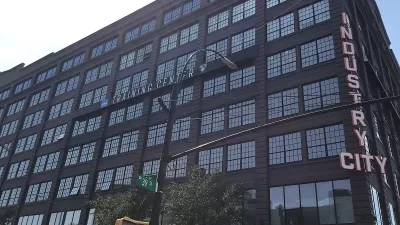On the media's responsibility for narratives that enable displacement, rather than inclusion.

Ben Adler writes a provocative piece about the tendency of the media to act like some neighborhoods didn't exist until they were gentrified:
"If you go to a gentrifying neighborhood and ask around, or just look at Census data, you will find that the neighborhood did in fact exist before it became trendy. Its population may have been lower; it certainly would have been poorer, and probably less white. But it was inhabited. And yet the media tells us otherwise, suggesting that until new residents showed up, these neighborhoods were 'a no man’s land,' still waiting to 'emerge.'"
Adler views these types of perspectives as a new version of American colonialism, with The New York Times providing the object of Adler's critique. Recent examples of the privileged perspective od colonialism includes takes on neighborhoods like Gowanus in Brooklyn and the South Bronx. Adler also finds an example in the Washington, D.C. local public radio station WAMU.
Instead of relying on easy, but false and, yes, offensive, tropes, Adler provides the following call to action:
"There is nothing wrong with news outlets reporting on these ongoing transformations, or with noting that affluent professionals weren’t looking for housing in these neighborhoods a few years ago. But heralding these population shifts as if they were filling a void — as if places lie fallow until a certain type of resident arrives — reflects exactly the sort of attitude that leads to displacement instead of integration."
FULL STORY: Hey, media: Those gentrifying neighborhoods had residents before the yuppies moved in

Montreal Mall to Become 6,000 Housing Units
Place Versailles will be transformed into a mixed-use complex over the next 25 years.

Planetizen Federal Action Tracker
A weekly monitor of how Trump’s orders and actions are impacting planners and planning in America.

DARTSpace Platform Streamlines Dallas TOD Application Process
The Dallas transit agency hopes a shorter permitting timeline will boost transit-oriented development around rail stations.

Study: 4% of Truckers Lack a Valid Commercial License
Over 56% of inspected trucks had other violations.

Chicago Judge Orders Thousands of Accessible Ped Signals
Only 3% of the city's crossing signals are currently accessible to blind pedestrians.

Philadelphia Swaps Car Lanes for Bikeways in Unanimous Vote
The project will transform one of the handful of streets responsible for 80% of the city’s major crashes.
Urban Design for Planners 1: Software Tools
This six-course series explores essential urban design concepts using open source software and equips planners with the tools they need to participate fully in the urban design process.
Planning for Universal Design
Learn the tools for implementing Universal Design in planning regulations.
City of Mt Shasta
City of Camden Redevelopment Agency
City of Astoria
Transportation Research & Education Center (TREC) at Portland State University
US High Speed Rail Association
City of Camden Redevelopment Agency
Municipality of Princeton (NJ)




























